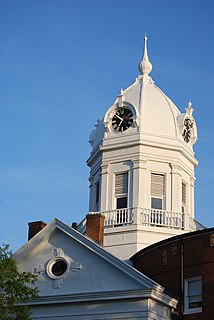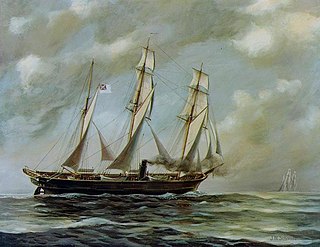
To Kill a Mockingbird is a novel by the American author Harper Lee. It was published in 1960 and was instantly successful. In the United States, it is widely read in high schools and middle schools. To Kill a Mockingbird has become a classic of modern American literature, winning the Pulitzer Prize. The plot and characters are loosely based on Lee's observations of her family, her neighbors and an event that occurred near her hometown of Monroeville, Alabama, in 1936, when she was ten.

Lee County is a county located in east central Alabama. As of the 2020 census the population was 174,241. The county seat is Opelika, and the largest city is Auburn. The county is named for General Robert E. Lee (1807–1870), who served as General in Chief of the Armies of the Confederate States in 1865. Lee County comprises the Auburn-Opelika, AL Metropolitan Statistical Area, which is included in the Columbus-Auburn-Opelika, GA-AL Combined Statistical Area.

Monroe County is a county located in the southwestern part of the U.S. state of Alabama. As of the 2020 census, the population was 19,772. Its county seat is Monroeville. Its name is in honor of James Monroe, fifth President of the United States. It is a dry county, in which the sale of alcoholic beverages is restricted or prohibited, but Frisco City and Monroeville are wet cities.

Auburn is a city in Lee County, Alabama, United States. It is the largest city in eastern Alabama, with a 2020 population of 76,143. It is a principal city of the Auburn-Opelika Metropolitan Area. The Auburn-Opelika, AL MSA with a population of 158,991, along with the Columbus, GA-AL MSA and Tuskegee, Alabama, comprises the greater Columbus-Auburn-Opelika, GA-AL CSA, a region home to 501,649 residents.

Monroeville is the county seat of Monroe County, Alabama, United States. At the 2020 census its population was 5,951.

The Alabama Claims were a series of demands for damages sought by the government of the United States from the United Kingdom in 1869, for the attacks upon Union merchant ships by Confederate Navy commerce raiders built in British shipyards during the American Civil War. The claims focused chiefly on the most famous of these raiders, the CSS Alabama, which took more than sixty prizes before she was sunk off the French coast in 1864.

Nelle Harper Lee was an American novelist best known for her 1960 novel To Kill a Mockingbird. It won the 1961 Pulitzer Prize and has become a classic of modern American literature. Lee has received numerous accolades and honorary degrees, including the Presidential Medal of Freedom in 2007 which was awarded for her contribution to literature. She assisted her close friend Truman Capote in his research for the book In Cold Blood (1966). Capote was the basis for the character Dill Harris in To Kill a Mockingbird.

John Tyler Morgan was a general in the Confederate States Army during the American Civil War, a six-term U.S. senator from the state of Alabama after the war. A slave holder before the Civil War, he was a proponent of Jim Crow laws, states rights and racial segregation through the Reconstruction era. He was an expansionist, arguing for the annexation of Hawaii and for U.S. construction of an inter-oceanic canal in Central America.

The United States District Court for the Middle District of Alabama is a federal court in the Eleventh Circuit.

Alabama State University (ASU) is a public historically black university in Montgomery, Alabama. Founded in 1867, ASU is a member-school of the Thurgood Marshall College Fund.

Samuel Cooper was a career United States Army staff officer, serving during the Second Seminole War and the Mexican–American War. Although little-known today, Cooper was technically the highest-ranking general officer in the Confederate States Army throughout the American Civil War, even outranking Robert E. Lee. After the conflict, Cooper remained in Virginia as a farmer.
The University of Alabama School of Law, ranked 25th by U.S. News, located in Tuscaloosa, Alabama is a nationally ranked top-tier law school and the only public law school in the state. It is one of five law schools in the state, and one of three that are ABA accredited. According to Alabama's official 2017 ABA-required disclosures, 84% of the Class of 2017 obtained full-time, long-term, JD-required employment nine months after graduation. An additional 8.4% of the Class of 2017 obtained JD-advantage employment.
Harper v. Virginia State Board of Elections, 383 U.S. 663 (1966), was a case in which the U.S. Supreme Court found that Virginia's poll tax was unconstitutional under the equal protection clause of the 14th Amendment. In the late 19th and early 20th centuries, eleven southern states established poll taxes as part of their disenfranchisement of most blacks and many poor whites. The Twenty-fourth Amendment to the United States Constitution (1964) prohibited poll taxes in federal elections; five states continued to require poll taxes for voters in state elections. By this ruling, the Supreme Court banned the use of poll taxes in state elections.

The Auburn Metropolitan Area—officially the Auburn-Opelika, Alabama Metropolitan Statistical Area—is a metro area in east-central Alabama with a 2016 population of 158,991. It was the 19th fastest growing metro area in the United States between 1990 and 2000. The Auburn Metro area consists of Lee County, and includes the cities of Auburn, Opelika, and the northernmost portion of Phenix City.
The Cumberland Law Review is a law review published by the students at Cumberland School of Law in Birmingham, Alabama.

Atticus Finch is a fictional character in Harper Lee's Pulitzer-Prize-winning novel of 1960, To Kill a Mockingbird. A preliminary version of the character also appears in the novel Go Set a Watchman, written in the mid-1950s but not published until 2015. Atticus is a lawyer and resident of the fictional Maycomb County, Alabama, and the father of Jeremy "Jem" Finch and Jean Louise "Scout" Finch. He represents the African-American man Tom Robinson in his trial where he is charged with rape of Mayella Ewell. Lee based the character on her own father, Amasa Coleman Lee, an Alabama lawyer, who, like Atticus, represented black defendants in a highly publicized criminal trial. Book magazine's list of The 100 Best Characters in Fiction Since 1900 names Finch as the seventh best fictional character of 20th-century literature. In 2003, the American Film Institute voted Atticus Finch, as portrayed in an Academy Award-winning performance by Gregory Peck in the 1962 film adaptation, as the greatest hero of all American cinema. In the 2018 Broadway stage play adapted by Aaron Sorkin, Finch is portrayed by various actors including Jeff Daniels, Ed Harris, Greg Kinnear, Rhys Ifans, and Richard Thomas.
Amasa Coleman Lee was an American newspaper editor, politician, and lawyer.
Manistee is an unincorporated community in Monroe County, Alabama, United States. Manistee was a logging town, and was home to the Manistee Mill Company, Bear Creek Mill Company and Runyan-Burgoyne Lumber Company. The Manistee Mill Company built a spur track to connect the saw mills of Manistee with the Louisville & Nashville Railroad in Repton and named it the Manistee & Repton Railway. The railway began operations in 1907 and remained in use until the 1970s, operating over 45 miles of track. Amasa Coleman Lee, father of Harper Lee, served as financial manager for a Monroeville law firm's interests in the Manistee & Repton Railway. A post office was operated in Manistee from 1892 to 1912.

Go Set a Watchman is a novel written by Harper Lee before her Pulitzer Prize-winning To Kill a Mockingbird (1960), her only other published novel. Although Go Set a Watchman was initially promoted as a sequel by its publisher, it is now accepted that it was a first draft of To Kill a Mockingbird with many passages in that book being used again.
















